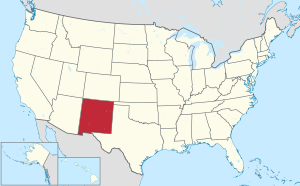New Mexico
New Mexico (Spanish: Nuevo México[Note 2][6] [ˈnweβo ˈmexiko] (![]() listen); Navajo: Yootó Hahoodzo Navajo pronunciation: [jòːtʰó hɑ̀hòːtsò]) is a state in the Southwestern region of the United States. It also borders Texas to the east and southeast, Oklahoma to the northeast, and the Mexican states of Chihuahua and Sonora to the south.
listen); Navajo: Yootó Hahoodzo Navajo pronunciation: [jòːtʰó hɑ̀hòːtsò]) is a state in the Southwestern region of the United States. It also borders Texas to the east and southeast, Oklahoma to the northeast, and the Mexican states of Chihuahua and Sonora to the south.
New Mexico | |
|---|---|
| State of New Mexico Estado de Nuevo México (Spanish) | |
| Nickname: The Land of Enchantment | |
| Motto: Crescit eundo (English: It grows as it goes) | |
Anthem:
| |
 Map of the United States with New Mexico highlighted | |
| Country | United States |
| Before statehood |
|
| Admitted to the Union | January 6, 1912 (47th) |
| Capital | Santa Fe |
| Largest city | Albuquerque |
| Largest metro and urban areas | Albuquerque Metropolitan Area |
| Government | |
| • Governor | Michelle Lujan Grisham (D) |
| • Lieutenant Governor | Howie Morales (D) |
| Legislature | New Mexico Legislature |
| • Upper house | Senate |
| • Lower house | House of Representatives |
| Judiciary | New Mexico Supreme Court |
| U.S. senators |
|
| U.S. House delegation |
|
| Area | |
| • Total | 121,591[1] sq mi (314,915 km2) |
| • Land | 121,298[1] sq mi (314,161 km2) |
| • Water | 292[1] sq mi (757 km2) 0.24% |
| • Rank | 5th |
| Dimensions | |
| • Length | 371 mi (596 km) |
| • Width | 344 mi (552 km) |
| Elevation | 5,701 ft (1,741 m) |
| Highest elevation | 13,161 ft (4,011.4 m) |
| Lowest elevation | 2,845 ft (868 m) |
| Population (2020) | |
| • Total | 2,117,522 |
| • Rank | 36th |
| • Density | 17.2/sq mi (6.62/km2) |
| • Rank | 45th |
| • Median household income | $51,945 |
| • Income rank | 45th |
| Demonym(s) | New Mexican (Spanish: Neomexicano, Neomejicano, Nuevo Mexicano)[4] |
| Language | |
| • Official language | None |
| • Spoken language | English, Spanish (New Mexican), Navajo, Keres, Zuni[5] |
| Time zone | UTC−07:00 (Mountain) |
| • Summer (DST) | UTC−06:00 (MDT) |
| USPS abbreviation | NM |
| ISO 3166 code | US-NM |
| Traditional abbreviation | N.M., N.Mex. |
| Latitude | 31°20′ N to 37°N |
| Longitude | 103° W to 109°3′ W |
| Website | nm |
New Mexico became a state on January 6, 1912 and became the 47th state accepted into the United States. The state capital is Santa Fe. Most of the people live in the biggest city, Albuquerque.
Climate
The climate for most of the state is generally semi-arid. In the summer it can be very hot in southern New Mexico. The temperature is sometimes over 100 °F (37.8 °C) with lows over 70 °F (21.1 °C). It occasionally snows in the northern part of the state in the winter. It is drier in the southern portion of the state, and it rarely snows. New Mexico is usually affected by the North American monsoon from mid June to late September.
History
New Mexico is the long-time home of the Pueblo people, a group of Native Americans. The area was named Nuevo México (New Mexico) by the Spanish in the mid-1500s and officially settled in 1598, its capital Santa Fe was selected in 1610. In the late 1600s, the Pueblo people revolted against the Spanish. The Spanish returned twelve years later, and made a better attempt at giving the Pueblos better representation in New Mexico’s society and government. One such Spanish governor of New Mexico, that is most well known for his work with Native Americans, was named Tomás Vélez Cachupín.
When Mexico became independent in the early 1800s, New Mexico was part of it. Mexico wasn’t successful in representing the New Mexican people, which lead to another revolt called the Chimayo Rebellion.
In 1846, the United States and Mexico went to war over a border dispute in Texas (a former state of Mexico that, after being its own country for a time joined the US), and the United States won the war. The peace treaty the two countries signed gave what is now the American Southwest to the United States. While most of what was then Northern Mexico did not have a large amount of people living in it, New Mexico had population centers in Pueblo and Spanish towns, especially along the Rio Grande river and in the Sangre de Cristo mountains. The New Mexican citizens living there were allowed to stay if they agreed to become US Citizens; over 90% did.
After some time as a territory, the area became a state in 1912.
Coyote Sandia Peak Tramway The Kiva at Nambe Pueblo
Related pages
References
Other websites

- New Mexico Indian Tribes Archived 2007-06-04 at the Wayback Machine
- New Mexico Monuments
- New Mexico National Parks
- Gila National Forest Archived 2007-07-26 at the Wayback Machine
Cite error: There are <ref group=Note> tags on this page, but the references will not show without a {{reflist|group=Note}} template (see the help page).





